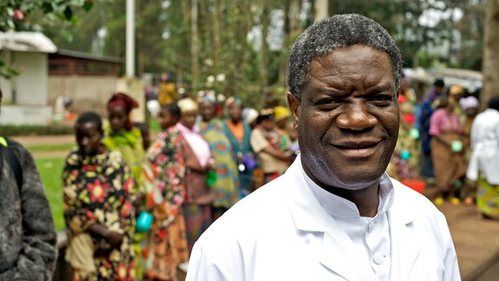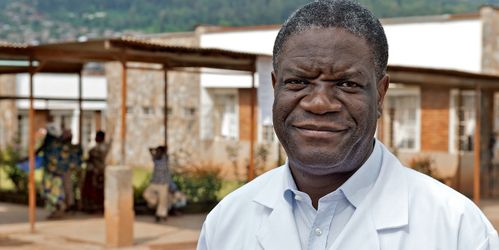Góður ávöxtur / Good fruit

Greinin birtist fyrst í Dagen 10. desember 2018 og er birt hér með leyfi. „Bænir hafa stigið upp frá þessum stað fyrir mínu ástkæra föðurlandi, og það eru forréttindi fyrir mig að fá að standa hér í kvöld, sem ávöxtur bæna ykkar. Kirkjan mín tilheyrir Hvítasunnuhreyfingunni Cepac í Kongó, sem hefur u.þ.b. eina milljón meðlima, og hún er ávöxtur bæna ykkar. Panzispítalinn er ávöxtur ykkar bæna.“ Þannig mælti Denis Mukwege þegar hann prédikaði á „Nyhemsveckan“ fyrir þremur árum, en hún er stærsta mót hvítasunnumanna í Svíþjóð. Nóbelsverðlaunahafinn er heittrúaður kristinn maður, og auk hans stórkostlega starfs sem skurðlæknir, er hann einnig pastor í hvítasunnukirkju í Bukavu. Ástríða Mukweges fyrir réttindum kvenna og gegn kynferðislegu ofbeldi segir hann hafa kviknað vegna kristinnar trúar sinnar. Kristið fólk innan hvítasunnuhreyfingarinnar og náðargjafvakningarinnar - fólk sem hefur sterka trú fyrir kraftaverkum, er oft gagnrýnt fyrir að vera yfirandlegt og að taka ekki ábyrgð þjóðfélagslega. Þessir fordómar byggja ekki á rannsóknum; stór hluti háskólasamfélagsins hefur lengi hunzað hvítasunnufólk. Það er ekki fyrr en á síðustu áratugum sem rannsóknir á starfi hvítasunnukirkna hafa farið í gang, og sú mynd sem þá kemur í ljós sýnir að Mukwege er fulltrúi einhvers miklu stærra en við höfðum gert okkur grein fyrir. Út kom fyrir fimm árum ritröðin „Pentecostalism and Development: Churches, NGOs (non-governmental orgaizations) and Social Change in Africa“. ritstýrt af Dena Freeman við London School of Economics. Ritið heldur fram að hvítasunnuhreyfingin hafi e.t.v. gert meira fyrir þróun og baráttu gegn fátækt í Afríku en allar alþjóða hjálparstofnanir samanlagt. Já þú last rétt, Freeman skrifar: Hvítasunnukirkjur eru oft sterkari áhrifavaldar til breytinga en hjálparstofnanir ... þær eru einstaklega áhrifaríkar í að leiða til aukins styrks og breytingar á hegðun einstaklinga, sem öðrum kosti myndu stríða gegn gildismati viðkomandi svæða. Þær enduruppbyggja fjölskyldur og samfélög á róttækan hátt í þeirri viðleitni að styrkja nýtt gildismat og nýja breytni. Án þess háttar félagslegra breytinga ... er torvelt fyrir efnahagslegar breytingar og þróun að eiga sér stað. Þessi fullyrðing er í samræmi við það sem félagsfræðingarnir Donald Miller og Tetsunao Yamamori uppgötvuðu nokkrum árum fyrr. Þeir hófu rannsókn á kirkjum í þróunarlöndunum sem störfuðu kröftuglega að félagslegum umbótum fólks sem minna máttu sín. Þegar þeir höfðu náð yfirsýn yfir þessar kirkjun fundu þeir út að 80% þeirra voru „hvítasunnu-karsimatiskar.“ Þeir ákváðu að freista þess að finna hver væri skýringin á þessu, sem leiddi til tilurðar bókarinnar „Global Pentecostalism: The New Face of Christian Social Engagement“. Þpersónulegri velmegun en þróun í sínum byggðarlögum, eru fordómar en ekki raunveruleikinn. Í Afríku, Asíu og Suður-Ameríku er hvítasunnuhreyfingin öflug í þjóðfélagslegum umbótum. Margir Svíar hafa haft allt aðra mynd í huga sér um hvítasunnumenn þrátt fyrir að hvítasunnumenn hafi í meira en öld heima í Svíþjóð unnið með fólk með fíknisjúkdóma, eða heimilislaust fólk og fátækt. Fordómar gagnvart hvítasunnukirkjum og kirkjum í náðargjafavakningunni hafa fest djúpar rætur og fólk þekkir ekki þessa gjörsamlega ólíku mynd sem þessir fræðimenn hafa lýst. Það var kristniboð sænskra hvítasunnumanna sem hóf hjálparstarfið í Lemera í austur D.R. Kongó á 5.áratug síðustu aldar Kristniboðarnir Simon og Selma Petersson, send af hvítasunnukirkjunni í Mölndal, byrjuðu með sjúkraskýlið sem síðan þróaðist í sjúkrahúsið sem Denis Mukwege hóf sinn læknisferil á 1983. Panzisjúkrahúsið , þar sem Denis vann meiri hluta síns starfsferils, var byggt í lok 10.áratugarins með fjármagni frá PMU, Pingsmissionens utvecklingssarmarbete (Þróunarsamvinnuhjálp Trúboðs Hvítasunnumanna). Kominn er tími til að stjórnmálamenn, hjálparstofnanir og fréttaskýrendur geri sér grein fyrir þessu. Vinnan að baki friðarverðlauna ársins 2018 er aðeins eitt dæmi um hvernig hvítasunnufólk breytir heiminum. Tökum alvarlega þetta afl sem breytir þjóðfélögum og notum gott samstarf hinna ýmsu kristnu safnaða og kirkjudeilda á þessu sviði til að heimurinn verið betri. Ivar Gustafsson, dósent í stærðfræði, aðstoðarforstöðumaður hvítasunnukirkjunnar í Mölndal Carl-Erik Sahlberg, fyrrv. forstöðumaður St.Clara kirkjunnar, nú búsettur í Tanzaníu. Greinarhöfundarnir eru fulltrúar Claphman-stofnunarinnar. |

“Prayers have gone up from this place, for my beloved home country, and it is a privilege for me to stand here tonight as a fruit of your prayers. My church belongs to CEPAC in Congo, which has around one million members, and is a fruit of your prayers. The Panzis hospital is a fruit of your prayers.” These were the words of Denis Mukwege when he preached three years ago at “Nyhemsveckan”, which is the largest national gathering of the pentecostal church in Sweden. The nobel laureate is a strong christian believer and alongside his remarkable work as a surgeon he pastors an pentecostal church in Bukavu. Dr. Mukwege’s says that his passion for womens rights and his fight against sexual violence are a direct result of his christian faith.
Pentecostal and charismatic christians, who value faith in miracles, are often criticised for being superspiritual and not interested enough in social issues. This prejudice is not based on research, the academic world has long ignored pentecostals. It is only in the last decades that pentecostalism began to be studied, and the picture that emerges indicates that Dr Mukwege is a representation of something much greater than anyone imagined.
Five years ago a study was published, titled ,,Pentecostalism and Development: Churches, NGOs and Social Change in Africa.” It was edited by Dena Freeman of London School of Economics. The book argues that the pentecostal movement may have done more for development and the fight against poverty in Africa than all international aid organisations combined.
Yes, you read correctly. Freeman writes: Pentecostal churches are often more effective drivers of change than aid organizations … they are exceptionally effective bringing about change which leads to personal strength and change in behaviour which would otherwise contrary to the local culture. They reconstruct families and societies in radical ways in order to support a new value system and way of life. Without this kind of social change… it is difficult for economical and social development to take place.
This assertion is consistent with the discovery sociologists Donald Miller and Tesunao Yamamor made a few years earlier. They began researching churches in developing countries that were actively working towards improving the quality of life for the most empoverished. Once they had a good overview of these churches they discovered that 80% of them were pentecostal/charismatic. They decided to turn their focus towards why this was so, which lead to the book “,Global Pentecostalism: The New Face of Christian Social Engagement.”
They coined the term “progressive pentecostalism” to describe pentecostal/charismatis who are actively engaged in their local communities to improve quality of life (without being theologically “progressive”). Miller maintains that this is in fact the dominating form of pentecostalism in the world. The idea that pentecostals are more concerned about the afterlife rather than social challenges in the hear and now, or that they are more concerned about personal and material prosperity rather than developement in their local communities, are prejudice rather than fact. Where the larger part of humanity lives, Africa, Asia and Latin-America, the pentecostal movement is a powerful force for social transformation.
In Sweden this is not the way many people view the pentecostal movement, even though that for more than a century pentecostals have been helping those struggling with addiction, caring for the homeless and the poor. Prejudice against pentecostals and charismatics are deep seated and the radically different picture that reasearch gives us is unkown to people. It was the Swedish pentecostal missions work that started the aid work in Lemere in eastern Congo in the 1940’s.
Missionaries Simon and Selma Petersson, sent by the pentecostal church in Mölndal, started th medical shelter which evolved into the hostpital where Denis Mukwege started his medical career 1983. The Panzis hospital, Mukwege’s workplace for most of his career, was built in the late 1990’s and financed by PMU (The international developement ministry of the Swedish Pentecostal church).
It is time for politicians, aid organizations and media to realize this reality. The work interwoven to the story of this years peace prize winner is just one example of how pentecostals are changing the world. Let us take seriously this force for social transformation and utilize the good ecumenical relations of Swedish churches and organisations to make the world a better place.
Ivar Gustafsson lecturer in mathematics, vice pastor of Mölndal pentecostal church
Carl-Erik Sahlberg Former pastor of St. Clara church, now residing in Tanzania
The authors are representatives of the Clapham institute.
No Comments